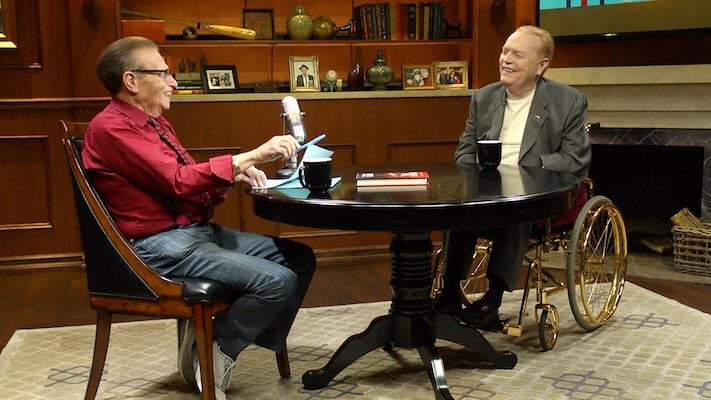Larry Flynt, Controversial Publisher and Cardroom Owner, Dies in California Home
Posted on: February 10, 2021, 11:48h.
Last updated on: February 11, 2021, 10:00h.
Larry Flynt, who founded Hustler magazine and would later own two California cardroom casinos, died Wednesday at age 78.

The Hustler Club in Las Vegas announced his death on its Twitter account. His brother, Jimmy, told The Cincinnati Enquirer Flynt died at his Los Angeles home because of heart failure.
Flynt was highly controversial. So, too, was his pornographic magazine. For some, he was a blunt champion of the First Amendment who challenged societal norms and championed parody. For others, he was a provocative publisher who never flinched in going beyond the bounds of good taste with explicit, graphic imagery.
Flynt was born in Lakeville, Ky., a tiny rural town in far eastern Kentucky on Nov. 1, 1942. He served a four-year stint in the Navy, and according to his biography on LarryFlynt.com, he was a radar operator on the USS Enterprise when it retrieved the space capsule carrying John Glenn on his historic space flight orbiting Earth.
In 1965, a year after leaving the Navy, he opened his first bar in Dayton. He then purchased two more from the profits of that one. In 1968, he opened the first Hustler Club, the first nude dancing establishment in the city.
As he opened more Hustler Clubs, he created a newsletter to promote them. That publication eventually became Hustler magazine, which was first published in July 1974.
Four years later, while on trial for an obscenity charge in Georgia, he was shot outside the courthouse. The shooting rendered him partially paralyzed for the rest of his life.
Flynt, whose life story became the subject of a 1996 movie, was married five times and had five children.
Flynt the Cardroom Owner
He got into the gaming business more than 20 years ago. He opened the Hustler Casino in June 2000 in the Los Angeles suburb of Gardena. The cardroom reportedly became his most profitable venture. In a 2007 feature in Card Player, he said he expected the casino to make more than $20 million that year.
If you can’t make it in the casino business, you can’t make it as a businessman,” Flynt told the Los Angeles Times in a 2017 article.
In 2016, Flynt bought the Normandie Casino in Gardena after its owners pleaded guilty in federal court to money laundering charges. He renamed the cardroom Larry Flynt’s Lucky Lady Casino. While he initially had a disagreement with city officials over taxes to the city, the two sides eventually came to an amicable agreement.
Flynt was an ardent lover of poker and was known to play against top pros. A 2017 feature on Phil Ivey in The Ringer mentioned that Flynt would host a regular game three times a week where hands got up to $4,000-$8,000 per bet. There was a particular game between Ivey and Flynt that helped chart Ivey’s career as a poker superstar.
According to poker pro database The Hendon Mob, Flynt also finished eighth in a $5,000 + $100 7-Card Stud World Series of Poker event in 2000. But 17 years prior, Flynt caused a major scandal at the WSOP Main Event. He finished 12th that year but WSOP.com reported that Flynn got several players to “dump” chips to him. That move supposedly enraged Jack Binion.
Federal Case Challenged California Gaming Law
Flynt in recent years challenged a 1986 California law that prohibited cardroom operators in the state from owning gaming properties elsewhere.
He, along with Haig Kelegian Sr. and Haig Kelegian Jr., filed a federal lawsuit in 2016 claiming the state law hinders interstate commerce. Flynt said that under the law he would have to sell his stake in the Hustler Las Vegas club if his partner wanted to add gaming there or buy into a casino business elsewhere.
Just last month, a federal judge denied a motion by the state to dismiss the case.
Related News Articles
Victoria Coren Mitchell First Repeat EPT Champion
Most Popular
Genovese Capo Sentenced for Illegal Gambling on Long Island
NBA Referees Expose Sports Betting Abuse Following Steve Kerr Meltdown
UPDATE: Former Resorts World & MGM Grand Prez Loses Gaming License
VEGAS MYTHS RE-BUSTED: The Traveling Welcome to Las Vegas Sign
Most Commented
-
UPDATE: Whiskey Pete’s Casino Near Las Vegas Closes
— December 20, 2024 — 33 Comments -
Caesars Virginia in Danville Now Accepting Hotel Room Reservations
— November 27, 2024 — 9 Comments -
UPDATE: Former Resorts World & MGM Grand Prez Loses Gaming License
— December 19, 2024 — 8 Comments -
FTC: Casino Resort Fees Must Be Included in Upfront Hotel Rates
— December 17, 2024 — 7 Comments
















No comments yet